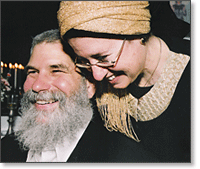An excerpt from Orchard of Delights
After
the yearly Torah reading cycle is completed on the morning of Simchat Torah, we
immediately begin the cycle again by reading the beginning of Bereishit,
recounting the creation of the world. This practice connects the end of the Torah
with its beginning, as discussed in the previous section. This ceremonial
completion and immediate new beginning takes place following fourteen circuits
of joyous dancing and singing with the Torah: seven of which occur Simchat
Torah night and seven which occur on Simchat Torah morning. While the Torah
scroll is rolled from its end to its beginning (or a second Torah scroll is
readied for use), we find ourselves in a
very unique situation, a sort of spiritual no man’s land, suspended somewhere
between the end and the beginning. Although it only takes a few minutes to roll
or ready the Torah scroll for use, symbolically speaking, these moments reflect
an emotion that Simchat Torah is imbued with – a sense of anticipation. For
during the entire three week period since Rosh Hashanah we have been living in
suspended animation, waiting for the new year to finally show its true face.
Since this will finally happen on the day after Simchat Torah – at the end of
the holiday season – we are now ready to conclude the Torah and begin reading
it again.
The Midrash teaches that the letters of the Torah are like black fire engraved
on parchment that is analogous to white fire (Yalkut Shimoni, Yitro
280). To understand even a small part of the wisdom encoded in the black fire
takes a life time; the wisdom engraved in the white fire is at present beyond
human comprehension. On Simchat Torah we do not emphasize studying Torah.
Instead we dance on the white fire as if all is an open book waiting to be
revealed. This dancing connects us in a most profound way to the Torah as an
Orchard of Delights.
The sense of suspended animation we are in is symbolized by our dancing for
hours in circles with the Torah scrolls; this, in turn, recalls the verse from
Job (26:6): “He hangs the world on nothingness.” The numerical value of the
Hebrew letters in this phrase is 913, the same as the numerical value of the
Torah’s first word, “bereishit” (“in the beginning”). Dancing at the beginning
of a year full of promise, we are imbued with joy, trust, and faith in what the
new year will bring to us as individuals and as Jews. Although the script of
the Torah is written and God has rendered and sealed our judgments for the
upcoming year, Judaism firmly believes that in some sense the script is still
blank as we all continue to write our own script every day of the year.
Paradoxically, far from being closed books, our lives are open to change; we
still have the ability to determine much of what we will experience in the
upcoming year. This realization brings with it great joy and power, as we
symbolically roll the Torah back to Bereishit and acknowledge our
ability to choose to begin again.
The Talmud states that everything goes after the sealing (Berachot 12a).
The manner in which we conclude any journey in life affects how we will
remember it and how it will impact on our lives. Therefore, the Sages decided
that we should conclude the yearly reading of the Torah and the High Holiday
season with great joy and celebration, so that this energy would remain with us
and carry over into the new year.
At one of the most climatic moments during the Rosh Hashanah and Yom Kippur
prayers, we declare that repentance, prayer, and charity have the power to
nullify negative decrees. Immediately following the Ten Days of Repentance, the
joyous holidays of Sukkot and Simchat Torah teach us that joy also has the
power to nullify negative decrees, wiping the slate clean, and allowing a truly
new year to begin.





